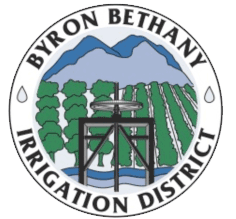Byron, CA (July 13, 2022) – Just days after ordering the Byron-Bethany Irrigation District (BBID) to shut off its pumps and halt water deliveries at the height of the growing season, the State Water Resources Control Board (Board) lifted the curtailments of BBID’s water rights.
At 4:07 on Tuesday, the Board issued a Drought Update advising that the pre-1914 water right serving much of BBID’s service area, and the post-1914 water right serving the District’s West Side Service Area, are no longer curtailed.
“Based on the latest guidance from the Board, BBID will immediately resume regular water deliveries,” said BBID Board President Russell Kagehiro. “We hope, at this point, the roller-coaster ride threatening the harvesting of many perishable crops in BBID will cease, and we can get back to the business of delivering water to our farmers and providing the sole source of water to the 28,000 people of Mountain House.”
Last week, with less than 24 hours’ notice, the Board abruptly curtailed BBID’s senior water rights, effective July 7th. That came one month after the Board advised Delta diverters, including BBID, that pre-1914 and post-1914 (without Term 91) water right holders in the Legal Delta would not be curtailed this year. After this latest action, it is unclear if future curtailments are possible this summer.
On Monday, the day before curtailments were lifted, BBID’s legal team filed an application for a Temporary Restraining Order in Sacramento County Superior Court, arguing the orders were issued without due process and are not supported by adequate evidence. BBID also argued the methodology used by the Board to determine water unavailability is fatally flawed. For months, the District’s team of legal, engineering, and hydrology experts worked continuously with the Board to refine the model to improve its accuracy and usability, but significant problems remain.
“In the weeks and months ahead, we urge the Board to recognize that these decisions are not made in a vacuum and have real consequences for the communities we serve,” Kagehiro added. “The back-and-forth of the last few days has left our growers in an extremely difficult position with crops just days away from harvest. We expect better from our governmental agencies.”
